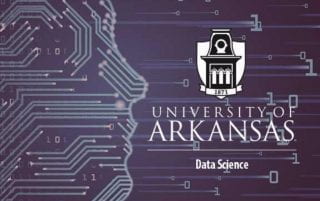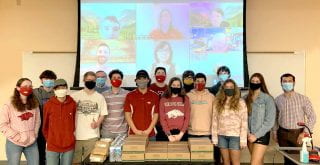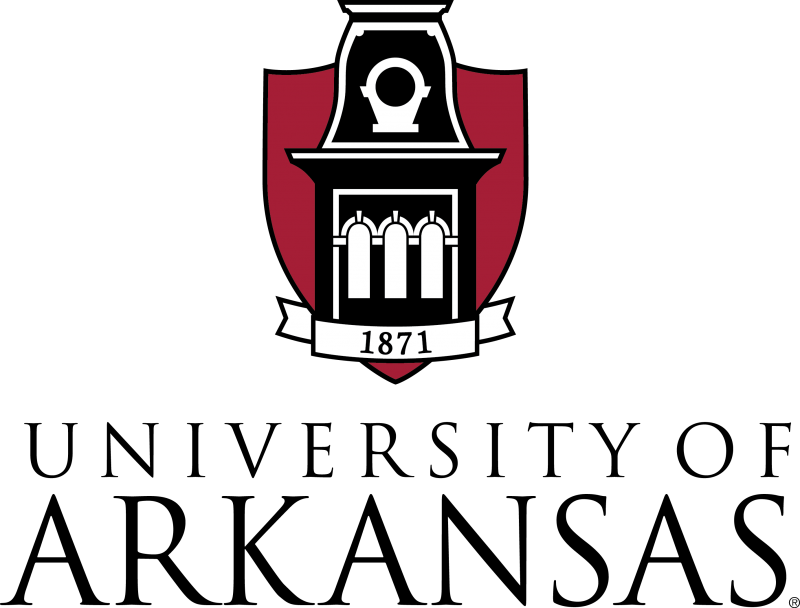U of A Grows Data Science Program and STEM Scholarship Opportunities
 In 2020, the University of Arkansas launched a unique undergraduate degree in data science.
In 2020, the University of Arkansas launched a unique undergraduate degree in data science.
Now, less than two years later, the program is thriving beyond expectations and providing more students than ever the opportunity to participate in a rigorous, innovative, multi-disciplinary learning experience that will prepare them to face some of the world’s biggest data-related challenges.
“We started our first cohort with 14 students working toward their B.S. in Data Science, and this past fall our second cohort included 71 students, which is just tremendous,” said Karl D. Schubert, associate director of the program and professor of practice in the College of Engineering.
“We did not expect to be at this number of incoming students until our fourth year. We are amazed and excited to continue to grow such an innovative program,” he added.
Schubert and his colleagues credit much of the program’s initial rapid growth and success to its unique structure, which gives students the chance to study with faculty from three colleges – the Fulbright College of Arts and Sciences, the College of Engineering and the Sam M. Walton College of Business.
This means students take a common set of introductory courses to build the foundations of a data science education and then choose one of 10 specialty concentrations to focus on during their junior year.
The concentrations include:
- Accounting Analytics
- Bioinformatics
- Biomedical and Healthcare Informatics
- Business Data Analytics
- Computational Analytics
- Data Science Statistics
- Geospatial Data Analytics
- Operations Analytics
- Social Data Analytics
- Supply Chain Analytics
 Samantha Robinson, Fulbright College’s director of data science and teaching assistant professor in the Department of Mathematical Sciences, said this approach gives U of A’s Data Science Program graduates the ability to make an immediate positive impact in the workforce.
Samantha Robinson, Fulbright College’s director of data science and teaching assistant professor in the Department of Mathematical Sciences, said this approach gives U of A’s Data Science Program graduates the ability to make an immediate positive impact in the workforce.
“Whether it’s analyzing health data to improve patient outcomes, helping businesses make smarter decisions, or supporting critical research needs, the ability to analyze huge data sets is a skillset that will serve our graduates well, no matter what field they are interested in pursuing within data science,” Robinson said.
The Data Science Program and degree came about in response to a growing need for organizations of all sizes and kinds to make sense of complex data sets, Robinson said.
 In addition to being the first of its kind at the U of A, the program is unique among data science programs nationwide for its interdisciplinary curriculum. The coursework was designed using best practices from existing programs and feedback from an advisory council of executives from industry.
In addition to being the first of its kind at the U of A, the program is unique among data science programs nationwide for its interdisciplinary curriculum. The coursework was designed using best practices from existing programs and feedback from an advisory council of executives from industry.
For example, in Fulbright College, the program’s courses range from a Data Ethics and Privacy course being taught in the Department of Philosophy, to Programming Languages for Data Science taught by the Departments of Biological Sciences and Mathematical Sciences, to Principles and Techniques of Data Science being taught in the Department of Geosciences.
“As technology advances, companies, governments, researchers and nonprofits across all fields and disciplines are gathering more data than ever before,” said Manuel Rossetti, director of the Data Science Program and University Professor in the College of Engineering. “The question now has become how to best use that data to make smarter decisions.”
In addition to its unique coursework and structure, Rossetti said the program also offers numerous scholarships. For example, the Multidisciplinary Data Science (MDaS) Scholarships, sponsored by a grant from the National Science Foundation.
The MDaS Scholarship program is designed to increase the graduation rate of underrepresented STEM undergraduate students interested in careers in data science.
The program is open to all STEM disciplines – science, technology, engineering and mathematics – but preference is given to students enrolled in the Data Science Program and disciplines related to data science, including industrial engineering, computer science and computer engineering, physics, biology and mathematics with a specialization in statistics.
The MDaS Scholarship program is hosting an in-person information session from 5-6 p.m., Tuesday, Jan. 25 in Bell 2286. Interested students can register online by Jan. 22 to participate.
Todd Shields, dean of Fulbright College, said he encourages all STEM students to explore this, and other numerous scholarship opportunities offered by the college and university, and to check out the Data Science Program as well.
“Our students are just so lucky! All the faculty involved in the Data Science Program from across the U of A are absolutely phenomenal,” Shields said. “They excel at helping our students learn to use data analysis for everything – from research to healthcare, to informed decision-making – which is a skillset that can change lives for the better for our students, who in turn will do the same for others in Arkansas and around the world.”
For a deep dive into the Data Science Program’s formation, check out this Short Talks from the Hill podcast featuring Karl Schubert.
Additionally, Schubert and Rossetti presented a paper describing the development of the Data Science Program at this past summer’s American Society of Engineering Education’s (ASEE) national conference. Read it online.
Then, visit the Data Science Program online to learn more, access resources for students looking to apply, and get information for businesses interested in partnering with the program for projects or internships.
